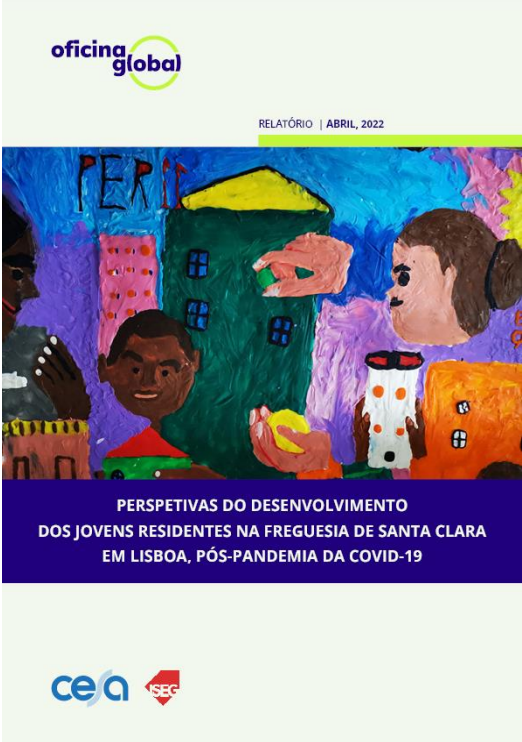Public Policy
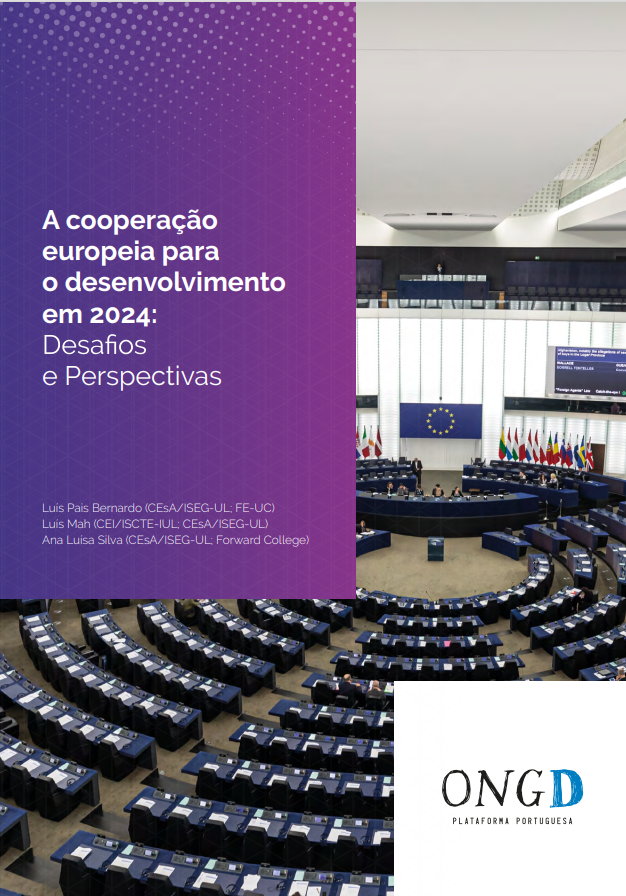
A Cooperação Europeia para o Desenvolvimento em 2024: Desafios e perspectivas
Abstract:
In a year of European Parliament (EP) elections, and amid growing global uncertainty, the study “European Development Cooperation in 2024: Challenges and Perspectives” was created following the publication “The Future of International Development Cooperation: Fragmentation, Adaptation, and Innovation in a Changing World” (2021). In this study, we outline the latest developments in the European Union’s (EU) international development cooperation (IDC) at the institutional and policy levels, highlighting the role of the European Parliament. We also examine the relationship between Portuguese IDC and its European counterpart, emphasizing the centrality of partner countries in the Portuguese-Speaking African Countries and Timor-Leste (PALOP-TL) and the role of civil society. We conclude with reflections on the implications for European cooperation, Portuguese cooperation, and civil society given the increasing importance of geopolitics in the current global context, the political-institutional transformations observed in European IDC, and the likely configuration of the EP for the new legislature, where it is expected that political forces opposing development cooperation will be strengthened.
Cite this ebook:
Bernardo, Luís Pais, Luís Mah e Ana Luísa Silva (2024). A cooperação europeia para o desenvolvimento em 2024 : desafios e perspectivas. Lisboa: Plataforma Portuguesa das ONGD
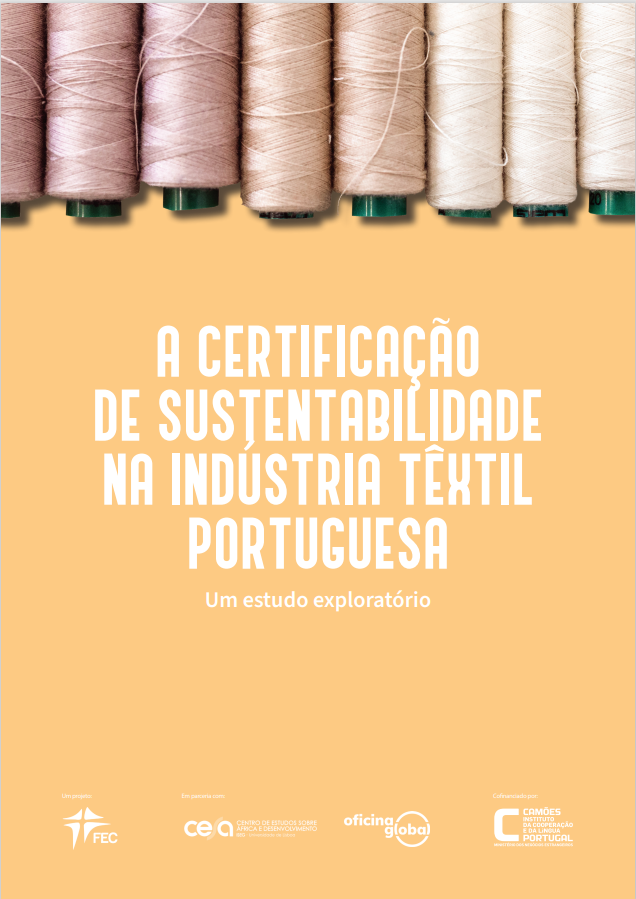
A certificação de sustentabilidade na Indústria Têxtil Portuguesa: um estudo exploratório
Abstract:
This study analyzes sustainability certification in the Portuguese textile industry. The main objective is to map the current landscape of sustainable practices adopted by this crucial sector of the Portuguese economy, evaluating the implications, challenges, and benefits of certification in the contemporary economic and environmental context. We aim to understand how sustainability certifications can serve as a strategic tool to boost the competitiveness of Portuguese companies in the global market, responding to the growing demand for ethical and environmentally conscious products.
The methodology employed in this study involves a review of the existing literature on sustainability in the textile industry. Essentially, it is a hybrid and comparative analysis, utilizing the complete universe of certified Portuguese textile companies. While this focused approach does not answer all questions, it allows this study to take a small step towards research committed to supporting companies that, despite clear risks and costs, choose to invest in sustainability. It also addresses the societal pressure that can and should be exerted on legislators to implement stronger regulatory frameworks and on companies that decide not to invest in sustainability.
This is a small step we hope will lead to further research efforts. We offer a perspective on the role of sustainability certification as a competitive differentiator for the Portuguese textile industry. The study emphasizes the growing importance of sustainability as a selection criterion for consumers and international business partners, reinforcing the need for Portuguese companies to continue investing in sustainable practices and obtaining certifications that validate their efforts. The study also presents and discusses recommendations for future policies and strategies, aiming to strengthen Portugal’s position as a leader in sustainable textile production on the global stage.
Cite this ebook:
Bernardo, Luís Pais (2024). A certificação de sustentabilidade na Indústria Têxtil Portuguesa : um estudo exploratório. Lisboa: Oficina Global.
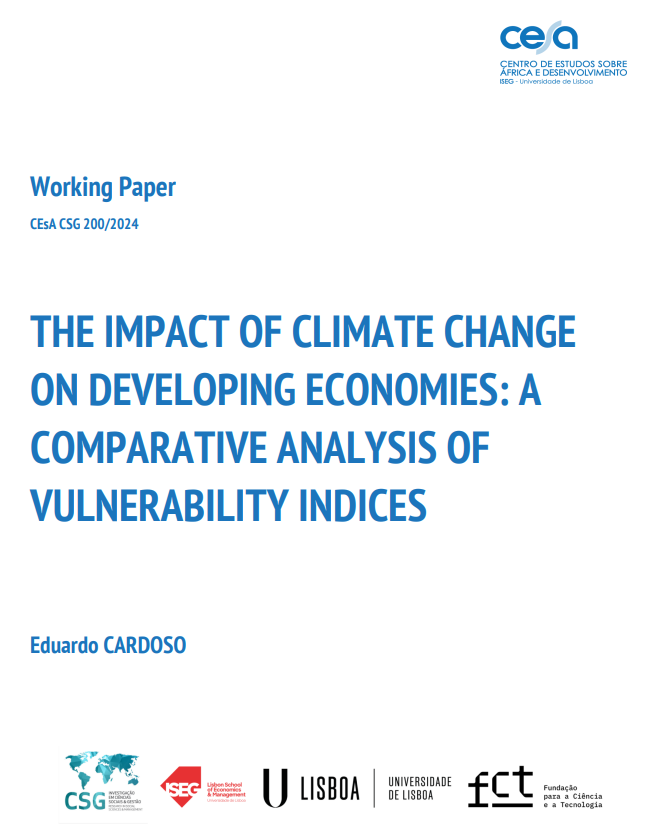
Working Paper 200/2024: The Impact of Climate Change on Developing Economies: A comparative analysis of vulnerability indices
Abstract:
In order to make informed decisions on climate finance and policies, there is an increasing need to develop an index to assess countries’ vulnerability to climate change. However, differing concepts and methodologies have led to varied views on which countries are most vulnerable and deserve more international financial support. This Working Paper examines whether key indices in climate science consistently classify countries’ vulnerability to climate disruption. It begins by reviewing literature on the impact of climate change on developing countries, followed by a comparative analysis of the EVI, ND-GAIN, INFORM, and WRI indices from 2014 to 2020. The findings indicate that while these indices are valuable for understanding and monitoring vulnerability, their differing components lead to divergent results. This research underscores the importance of a holistic approach to vulnerability assessment and calls for informed selection of indices based on specific objectives and contexts.
Cite this Working Paper:
Cardoso, Eduardo (2024). “The Impact of Climate Change on Developing Economies: A comparative analysis of vulnerability indices”. CEsA/CSG – Documentos de Trabalho nº 200/2024.
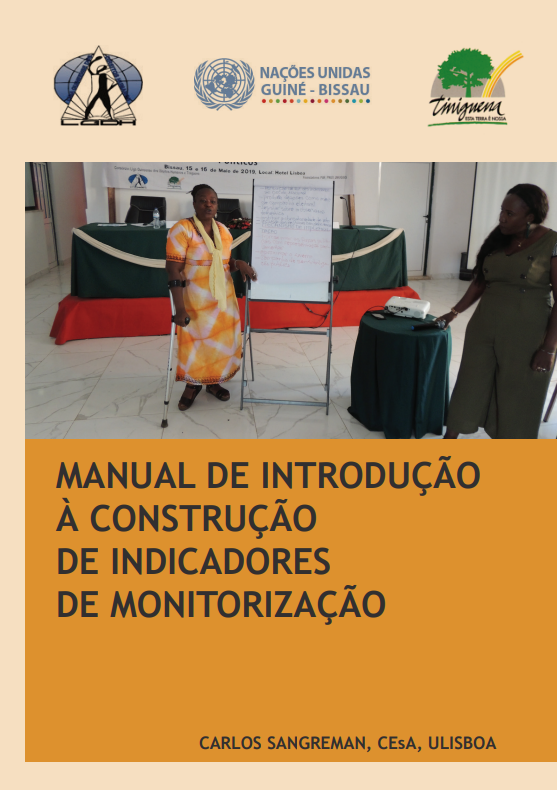
Manual de Introdução à Construção de Indicadores de Monitorização
Abstract:
Manual de Introdução a construção de indicadores de monitorização is a working and training tool for technicians from public and private, national or international institutions working in the area of development and public policies. Its objective is to enable technical experts to develop capacities to think about indicators that are appropriate for projects and policies in their area of intervention. The technical level is introductory to the subject and does not indicators on business management, for example, finance or macroeconomics, and no previous knowledge of mathematics or statistics is required beyond the basics and common sense. It contains chapters with a theoretical part and a practical part, through examples applicable to Guinea-Bissau, on simple and composite, quantitative and qualitative and composite, quantitative and qualitative indicators, short and long term sampling and descriptive statistics. Since this version is prepared for Guinea-Bissau, the last chapter seeks to reflect on the lessons from the lessons learned from the Manual on the construction of indicators which are included in the Political and Social Stability Pact (Pact), signed in 2018, as an example of a multidisciplinary area with fundamental interest for the country.
Quotation:
Sangreman, Carlos (2021). Manual de Introdução a construção de indicadores de monitorização, PNUD/UNIOGBIS, Delegação da Guiné-Bissau, 2020. Liga Guineense dos Direitos Humanos (LGDH) e Tiniguena.
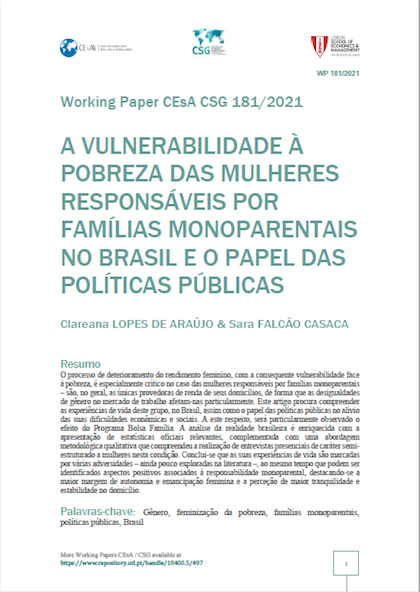
Working Paper 181/2021: A Vulnerabilidade à Pobreza das Mulheres Responsáveis por Famílias Monoparentais no Brasil e o Papel das Políticas Públicas
Abstract:
The deterioration of women’s income, and their consequent vulnerability to poverty, is particularly critical in the case of women who are the head of single-parent families – being them the only provider to the household, gender inequalities in the labor market affect them more significantly. A Vulnerabilidade à Pobreza das Mulheres Responsáveis por Famílias Monoparentais no Brasil e o Papel das Políticas Públicas seeks to understand the life experiences of these women, in Brazil, as well as the role of the State in alleviating their economic and social difficulties, where the effect of the Bolsa Família Programme will be studied in particular. The analysis of the Brazilian reality is enhanced by the presentation of relevant official statistics, complemented by a qualitative methodological approach based on semi-structured interviews conducted with women in this situation. It is concluded that their life experiences are affected by several hardships that are still relatively under-researched, but also by positive aspects related to their condition as single parents, above all in terms of their autonomy and perception of greater emancipation, as well as living in a safe and emotionaly stable environment.
Quotation:
Araújo, Clareana Lopes de e Sara Falcão Casaca (2021). “A vulnerabilidade à pobreza das mulheres responsáveis por famílias monoparentais no Brasil e o papel das políticas públicas”. Instituto Superior de Economia e Gestão – CEsA/ CSG – Documentos de Trabalho nº 181/2021.
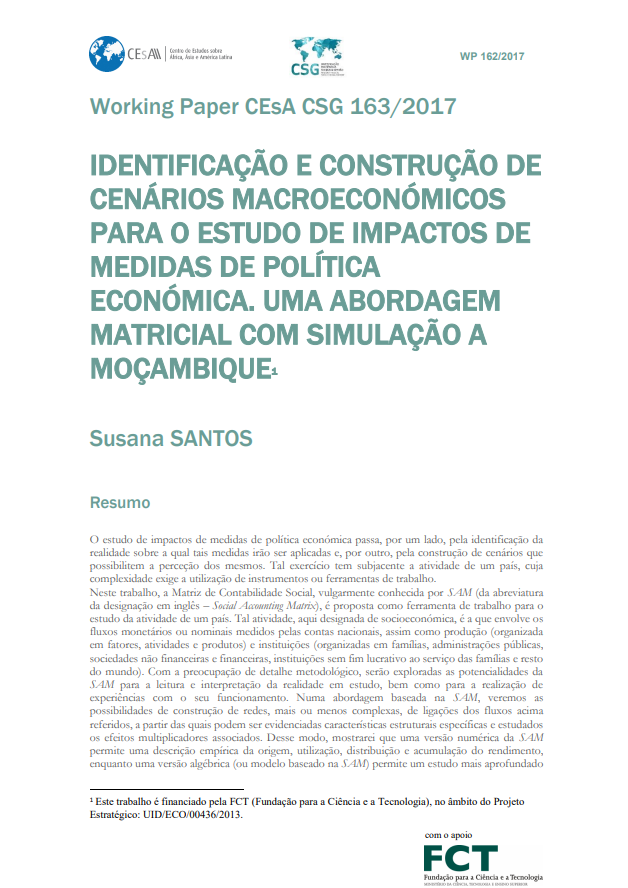
Working Paper 163/2017: Identificação e Construção de Cenários Macroeconómicos para o Estudo de Impactos de Medidas de Política Económica. Uma abordagem matricial com simulação a Moçambique
Abstract:
The study of the impacts of economic policy measures involves, on the one hand, the identification of the reality on which such measures will be applied and, on the other hand, the construction of scenarios that allow their perception. This exercise is based on the activity of a country, whose complexity requires the use of instruments or work tools. Identificação e Construção de Cenários Macroeconómicos para o Estudo de Impactos de Medidas de Política Económica. Uma abordagem matricial com simulação a Moçambique, the Social Accounting Matrix, commonly known as SAM (from the abbreviation of the name in English – Social Accounting Matrix), is proposed as a working tool for the study of the activity of a country. Such activity, here designated as socio-economic, involves monetary or nominal flows measured by national accounts, as well as production (organized into factors, activities and products) and institutions (organized into households, public administrations, non-financial and financial corporations, non-profit institutions serving families and the rest of the world). With a concern for methodological detail, the potential of SAM will be explored for the reading and interpretation of the reality under study, as well as for carrying out experiments with its operation. In an approach based on SAM, we will see the possibilities of building networks, more or less complex, of connections of the flows mentioned above, from which specific structural characteristics can be highlighted and the associated multiplier effects studied. In this way, I will show that a numerical version of the SAM allows an empirical description of the origin, use, distribution and accumulation of income, while an algebraic version (or model based on the SAM) allows for a more in-depth study of the multiplier effects (or impacts) associated with changes in these flows, caused by the adoption of policy measures, for example. I will exemplify such potentialities of SAM, giving special attention to the functional and institutional distribution of income, through the construction and analysis of two scenarios involving changes in the remuneration of production factors and in the income of institutions. Such an application will allow the identification of the relevant role of production factor accounts (from SAM), as they establish the link between income generation and the corresponding distribution and use. I will also emphasize the importance of a matrix approach in the identification and construction of macroeconomic scenarios in the study of impacts of economic policy measures, highlighting the complementary details that an InputOutput Matrix (IOM) can add. An application to the case of Mozambique in 2015 will accompany the presentation. In this application we will often talk about simulation due to the unavailability of information regarding all the flows worked.
Quotation:
Santos, Susana (2017). “Identificação e construção de cenários macroeconómicos para o estudo de impactos de medidas de política económica. Uma abordagem matricial com simulação a Moçambique”. Instituto Superior de Economia e Gestão – CEsA/ CSG – Documentos de Trabalho nº 163/2017.
